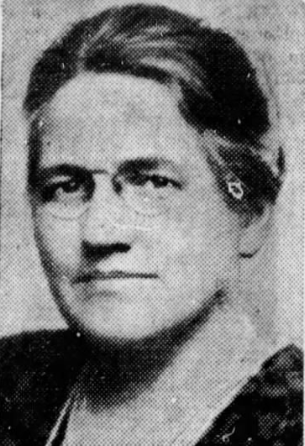

Partner Florence Ellinwood Allen
Queer Places:
MacMurray College, 447 E College Ave, Jacksonville, IL 62650
Asbury Cemetery
Raymond, Montgomery County, Illinois, USA
 Susan
Mattie Rebhan (1885 - September 12, 1935)
was a lawyer, and from 1922 until her death in 1935, she lived with Florence Allen.
Rebhan organized supporters and managed campaigns for Allen.
Susan
Mattie Rebhan (1885 - September 12, 1935)
was a lawyer, and from 1922 until her death in 1935, she lived with Florence Allen.
Rebhan organized supporters and managed campaigns for Allen.

Florence Allen and her friends entertaining themselves in front of Allen's cottage in Moraine Park. Susan Rebhan is standing with her arm around Florence Allen who is helping to support Mary E. Pierce. Bertha "Bert" Miller is below Mary's foot.
Susan Mattie Rebhan was born in Raymond, Illinois. She attended the MacMurray College or Illinois Women's College in Jacksonville, Illinois, Class '05 (scientific course). She was part of the Phi Nu society. For 10 years after graduation she taught math and science in high schools of Illinois. In 1905 she was the principal of the High School of Forest, near Kenton, Ohio. In 1915 she was appinted teacher in the Collinsville (St Louis, Missouri) Township High School. In 1915 she took a year's training at the International YWCA Training School in New York City. In 1916 she became the general secretary of the YWCA of Youngstown, Ohio. She resigned in 1920 to become secretary of the YWCA for Ohio and West Virginia district, and later national secretary with headquarters in San Francisco.
Rebhan was Allen's greatest aid in her bid for election to the Ohio Supreme Court in 1922 and reelection in 1928. Thanks to both Rebhan's strategizing and the ten of thousands of women whom Rebhan organized into Florence Allen Clubs, Allen won by a huge margin.
Allen and Rebhan's social life was tied to their professional life. Their closest friends were generally lesbian couples who worked in the law or in public policy positions. Together, they often visited Greenwich Village, where they spent time with Molly Dewson and her partner, Polly Porter, as well as with Eleanor Roosevelt's circle of lesbian fiends, and they often corresponded with and visited Frances Kellor and Mary Dreier. These women acknowledged each other's relationships with ease in the 1920s and '30s; however, in the years after World War II they were forced to become cognizant of the dangers of not being discreet about lesbianism. Allen's friend Judge Marion Harron, who had almost lost her federal judgeship in 1947 when it was suspected that she was a lesbian, was the one who led the continued campaign for Allen's appointment to the Supreme Court in the 1950s, much as Allen was grateful that Herron encouraged and headed the group of women who persisted on her behalf, she was nevertheless worried about having a suspected lesbian push for the high advancement of another suspected lesbian. Sadly, she wrote to judge Harron about her "concern ... to protect You and Me," begging her to be "Anonymous" and to save them "both from possible embarrassment or worse." A fabulous network — a remnant of women who had carded the work of the pioneers into the mid-twentieth century — was thus effectively frightened and all but silenced.
In 1923 Rebhan entered Ohio State University Law School in Cincinnati when Florence Allen moved to Columbus and lived with the Allens. Rebhan was a member of the Business and Professional Women's club of Cincinnati. In Cleveland she had been the chairman of the credential committee. Later she was an executive secretary at the Department of Justice (a position that Molly Dewson found for her, as Allen's mate). In May 1926 Rebhan was the campaign manager for Allen when Allen ran for the Democratic nomination for the Senate.
Rebhan earned a law degree while Allen served on the Ohio Supreme Court. She was a pupil of former Judge Frank R. Gusweiler. While studying law, Rebhan was chairman of the advisory board of the Ohio Mutual Mortgage Co, an organization composed entirely of women. In December 1926 Rebhan was admitted to the Ohio State bar with honors ahead a class of 244 students. Rebhan was a busy and successful practing laywer. At first practiving with the firm of Bartholomew, Leeper and McGill, she then was in partnership with another woman lawyer, Dorothy Hyde, and they had an office in downtown Cleveland. Susan maintained an apartment in the city and ran for the city council in the declining years of the city manager system. She won easily, but after one term resigned. In 1931 she was appointed to the Ohio state bar examining board, the first and only woman member in Ohio and the first woman in the United States. In 1934 Rebhan was proposed to the state court bench in replacement of Allen when she moved to the high court. Shortly before her death in 1935, Rebhan was appointed as special attorney for Ohio, handling titles in the submarginal lands and subsistence homestead administration; she held several other important offices since she began the practice of law and service as assistant law director for the city of Cleveland.
During court recess, Allen shared a Cleveland home with two close friends and career women, Susan Rebhan and Mary E. Pierce (1891-1978), and an assortment of cocker spaniel; which she adored. Until Allen died in 1966, she lived with Mary Pierce, a teacher and director of Park School. Allen's biographer, historian Jeannete Tuve, describes the three as having "deep and enduring" commitments to each other.
Allen owned a sixteen-acre retreat in Lake County with a shack, which in the early 1940s, she and Mary—having lost Susan to influenza in 1935—eventually refurbished into a year-round home.
Rebhan died in Cleveland on September 12, 1935.
My published books: